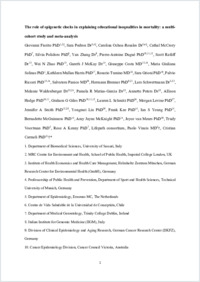The Role of Epigenetic Clocks in Explaining Educational Inequalities in Mortality: A Multicohort Study and Meta-analysis
DOKPE
- Carmeli, Cristian ORCID University of Fribourg
- Fiorito, Giovanni ORCID University of Sassari
- Pedron, Sara Institute of Health Economics and Health Care Management, Helmholtz Zentrum München
- Ochoa-Rosales, Carolina Department of Epidemiology, Erasmus MC, Rotterdam
- McCrory, Cathal ORCID Department of Medical Gerontology, Trinity College Dublin
- Polidoro, Silvia Italian Institute for Genomic Medicine (IIGM), Turin
- Zhang, Yan ORCID Division of Clinical Epidemiology and Aging Research, German Cancer Research Center (DKFZ), Munich
- Dugué, Pierre-Antoine ORCID Cancer Epidemiology Division, Cancer Council Victoria, Australia
- Ratliff, Scott Department of Epidemiology, School of Public Health, University of Michigan
- Zhao, Wei N Department of Epidemiology, School of Public Health, University of Michigan
- McKay, Gareth J ORCID Centre for Public Health, Queen’s University Belfast
- Costa, Giuseppe Epidemiology Unit, Regional Health Service TO3, Grugliasco
- Solinas, Maria Giuliana Departmentof Biomedical Sciences, University of Sassari
- Harris, Kathleen Mullan Department of Sociology, University of North Carolina
- Tumino, Rosario ORCID Cancer Registry and Histopathology Department, Provincial Health Authority (ASP 7), Ragusa
- Grioni, Sara ORCID Epidemiology and Prevention Unit, Fondazione IRCCS Istituto Nazionale dei Tumori di Milano
- Ricceri, Fulvio ORCID Epidemiology Unit, Regional Health Service TO3, Grugliasco
- Panico, Salvatore ORCID Dipartimento di Medicina Clinica e Chirurgia, University of Naples Federico II
- Brenner, Hermann Division of Clinical Epidemiology and Aging Research, German Cancer Research Center (DKFZ), Munich
- Schwettmann, Lars Institute of Health Economics and Health Care Management, Helmholtz Zentrum München
- Waldenberger, Melanie Research Unit Molecular Epidemiology, Institute of Epidemiology, Helmholtz Zentrum München,
- Matias-Garcia, Pamela R Research Unit Molecular Epidemiology, Institute of Epidemiology, Helmholtz Zentrum München
- Peters, Annette ORCID Institute of Epidemiology, Helmholtz Zentrum München
- Hodge, Allison Cancer Epidemiology Division, Cancer Council Victoria
- Giles, Graham G Cancer Epidemiology Division, Cancer Council Victoria, Victoria, Australia
- Schmitz, Lauren L Robert M. La Follette School of Public Affairs, University of Wisconsin-Madison
- Levine, Morgan Department of Pathology, Yale University School of Medicine
- Smith, Jennifer A. ORCID Centre for Public Health, Queen’s University Belfast
- Liu, Yongmei Division of Cardiology, Department of Medicine, School of Medicine, Duke University
- Kee, Frank Centre for Public Health, Queen’s University Belfast
- Young, Ian S Centre for Public Health, Queen’s University Belfast
- McGuinness, Bernadette Centre for Public Health, Queen’s University Belfast
- McKnight, Amy Jayne Centre for Public Health, Queen’s University Belfast
- van Meurs, Joyce Department of Internal Medicine, Erasmus MC, Rotterdam
- Voortman, Trudy ORCID Department of Epidemiology, Erasmus MC, Rotterdam
- Kenny, Rose A Department of Medical Gerontology, Trinity College Dublin, Dublin
- Lifepath consortium
- Vineis, Paolo ORCID MRC Centre for Environment and Health, School of Public Health, Imperial CollegeLondon
- 17.02.2022
Published in:
- The Journals of Gerontology: Series A. - 2022, vol. 77, no. 9, p. 1750-1759
Biomarkers
DNA methylation
Longevity
Social inequalities
Aging
Biological markers
Life style
Knowledge acquisition
Morbidity
Mortality
Epigenetics
English
Educational inequalities in all-cause mortality have been observed for decades. However, the underlying biological mechanisms are not well known. We aimed to assess the role of DNA methylation changes in blood captured by epigenetic clocks in explaining these inequalities. Data were from 8 prospective population-based cohort studies, representing 13 021 participants. First, educational inequalities and their portion explained by Horvath DNAmAge, Hannum DNAmAge, DNAmPhenoAge, and DNAmGrimAge epigenetic clocks were assessed in each cohort via counterfactual-based mediation models, on both absolute (hazard difference) and relative (hazard ratio) scales, and by sex. Second, estimates from each cohort were pooled through a random effect meta-analysis model. Men with low education had excess mortality from all causes of 57 deaths per 10 000 person-years (95% confidence interval [CI]: 38, 76) compared with their more advantaged counterparts. For women, the excess mortality was 4 deaths per 10 000 person-years (95% CI: −11, 19). On the relative scale, educational inequalities corresponded to hazard ratios of 1.33 (95% CI: 1.12, 1.57) for men and 1.15 (95% CI: 0.96, 1.37) for women. DNAmGrimAge accounted for the largest proportion, approximately 50%, of the educational inequalities for men, while the proportion was negligible for women. Most of this mediation was explained by differential effects of unhealthy lifestyles and morbidities of the World Health Organization (WHO) risk factors for premature mortality. These results support DNA methylation-based epigenetic aging as a signature of educational inequalities in life expectancy emphasizing the need for policies to address the unequal social distribution of these WHO risk factors.
- Faculty
- Faculté des sciences et de médecine
- Department
- Master en médecine
- Language
-
- English
- Classification
- Pathology, clinical medicine
- License
-
License undefined
- Open access status
- green
- Identifiers
- Persistent URL
- https://folia.unifr.ch/unifr/documents/320223
Other files
Statistics
Document views: 87
File downloads:
- 20220211_manuscript_accepted: 127
- 20220211_supplementarymaterial: 71

